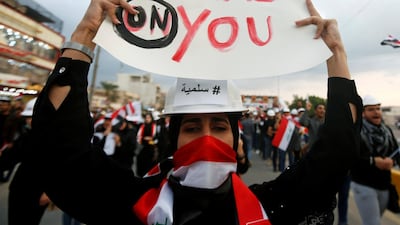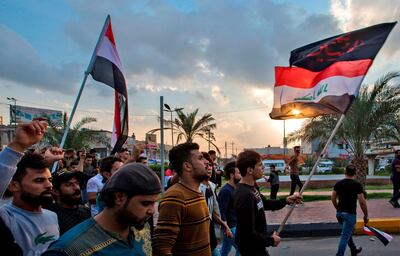Celebrations broke out in Baghdad on Friday after Iraqi Prime Minister Adel Abdul Mahdi stated he will submit a request to resign to the country’s parliament.
But in Iraq’s southernmost province of Basra, protesters were more enthused by Iraq’s football goals in Friday’s match against the Emirates than they were by Mr Abdul Mahdi’s offer of resignation.
“Now we’ve just achieved a partial victory, the next victory, God willing, will be … the parliament’s resignation and new elections,” said a protester in Basra who wished to remain anonymous.
Protesters in Basra not only wanted the government’s resignation, they want political leaders to stand trial for the violence that has occurred over the course of the protests.
“We want trials of the leaders, the leaders of the corrupt, all of them,” the protester added.
“Iraq will not remain a weak country controlled by neighbouring nations. It will return to being a pivotal state leading in the region.”
Basra’s issues are emblematic of complaints echoed across Iraq’s protests. It holds 60 per cent of Iraq’s oil reserves, but youth unemployment stands at 30 per cent, above the staggering national average of 25 per cent.
The city also suffers from a chronic lack of basic services, and a spiralling health crisis compounded by Iraqi authorities’ failure to manage waste and ensure healthy drinking water.
“We want a nation, we don’t have a nation. Do you see the streets? They haven’t done anything, it’s been 16 years and they haven’t done anything,” said Hussein, a 15-year-old protester who did not want to give his real name out of security concerns.
“We want a nation because we have no security. Everything is stolen, all the oil money goes. The people want their rights.”
Sixty per cent of Iraq’s population of 40-million are under the age of 25, and many of those who have streamed out to join the protests are young men and women under the age of 30.
“All of our generation comes here,” said Hussein, “We’re at the frontline. Eight of my friends were injured and two of my friends were killed ... I’m not afraid. I came out to claim my rights, not to steal anything.”
He, like many other protesters, said that he would continue protesting regardless of Mr Abdul Mahdi’s resignation.
“It’s not enough, we want a new government. Not the like the one we have now, a better one.”
“This [Mr Abdul Mahdi’s resignation] is the result of the protests, the result of the blood of the buried martyrs,” said Muntather Furas, 18.
“God willing, the rest will follow. Just Adel Abdul Mahdi won’t do anything, the killers will bring in another prime minister and the same thing will happen, there won’t be a difference.”
Mr Abdul Mahdi came to power as a compromise candidate between the Sairoon and Fatah coalitions in parliament, and many protesters do not believe that he holds true power in the Iraqi government.
“Our problem is not with Mr Abdul Mahdi, our problem is with the government in general, the resignation is not enough, especially after the Thursday of blood,” said Mustafa Alaa, a young protester.
“Yesterday, many souls were lost, and God willing our message for those martyrs and for the blood of the martyrs is that we will stay and we will not forget the martyrs that we lost yesterday for a second.”
The offer to resign came shortly after a sermon from Iraq’s foremost cleric Grand Ayatollah Ali Al Sistani urging the parliament to change the cabinet following a wave of violence that has rocked the country.
Security forces killed at least 45 protesters across Iraq’s southern provinces on Thursday, with thousands more injured in one of the most brutal days since the outbreak of the protests at the beginning of October.
Violence continued to rage in the southern city of Nasiriyah on Friday with at least seven killed.
The bloodshed in Iraq has transformed protesters’ initial demands of basic services, job opportunities, and education into calls for the resignation of the entire government.
Street protests have taken place daily across southern Iraq daily since the beginning of October, driven by economic hardship and aimed at endemic corruption.
They have been met with a vicious crackdown that has left more than 400 protesters dead and thousands injured.
Mr Al Sistani is an influential cleric whose weekly Friday sermons carry great weight in Iraq.
Prime Minister Abdul Mahdi stated that he had “listened carefully” to Mr Al Sistani’s sermon, and had decided to submit his resignation in response to the cleric’s words.
"The role of the Marjayia [the religious elite] is evident through the sermons, and it is to support peaceful demonstrations, because it is the only way to collect people's rights and save the blood of the people, which the most important thing," Jassam Mohamed Al Saadi, spokesperson for international media at the Abbas shrine Karbala told The National on Thursday.
“They call for the removal of the corrupt and changing the electoral law, changing the electoral commission and replacing it with independent individuals, in order to change to a democratic system where there is no difference between the sects.”
He explained that Mr Al Sistani wants a peaceful transition of government and stands against a violent change of regime.
"The Sayed [a respectful term for Mr Al Sistani] is against the military coup because he believes the right way to manage people's affairs is through democracy, and what is happening now from the government is not democracy," he said.


